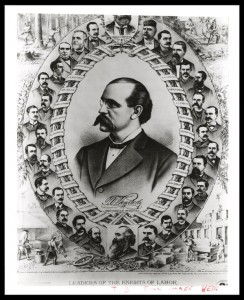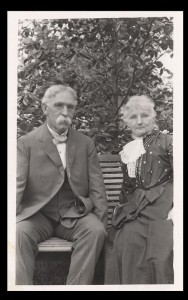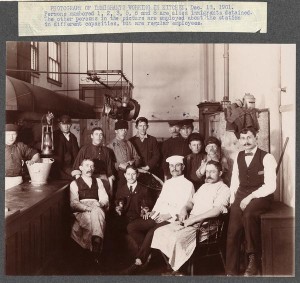
January 22 is the birthday of Terence Vincent Powderly (1849-1924), a man not widely remembered in the twenty-first century, but a national celebrity, an ‘American Idol’ if you will, in the tumultuous era of the late nineteenth century. Born in Carbondale, Pennsylvania, to Irish-Catholic immigrants, Powderly was a reform minded Mayor of Scranton (1878-1884), head of the national Knights of Labor union (1879-1893), and federal bureaucrat (1897-1924). He was also a supporter of Irish nationalism, serving in Clan na Gael, a secret Irish independence society, and the Irish Land League, a political organization supporting tenant farmers.

A railroad worker, Powderly joined the Scranton Local Assembly of the Knights of Labor in 1876, assuming the national leadership as Grand (later General) Master Workman, 1879-1893. The Knights came into national prominence during his tenure, in part due to his rousing public oratory, peaking in national membership and influence in 1886. At this point, Powderly was so popular there were babies named for him. However, failures in several labor disputes and a divisive power struggle saw the Knights rapidly decline and Powderly removed by a cabal involving John William Hayes, whose papers are also at CUA. Perhaps Powderly’s greatest achievement, greatly aided by Cardinal James Gibbons of Baltimore, was to bring about reconciliation between the labor movement and the Roman Catholic Church that distrusted and disapproved of labor organizations due to their secretive and ritualistic activities.

Campaigning for the Republicans in the 1896 presidential campaign, Powderly was rewarded by President William McKinley with appointment as Commissioner General of Immigration. Powderly’s efforts to reform conditions at Ellis Island prompted President Theodore Roosevelt to dismiss him in 1902, though he was reinstated in 1906 as a Special Immigration Inspector. Powderly next served as Chief of the Division of Information, U.S. Bureau of Immigration, 1907-1921, and as the U.S. Department of Labor’s Commissioner of Conciliation, 1921-1924. He was also author of Thirty Years a/Labor (1889) and his posthumous memoirs, The Path I Trod (1940). In 1999 was honored as an inductee into the U.S. Department of Labor’s Hall of Honor, joining figures such as rival Samuel Gompers and friend Mary Harris “Mother” Jones.
Powderly’s papers, donated to Catholic University by his niece Mary Powderly in 1941, consist largely of his official correspondence as head of the Knights of Labor as well as material from his tenure as an official for both the Immigration and Labor departments, and reveal his mark on American labor and immigration history. Powderly’s photographs are especially compelling and form the basis of an online digital collection. In addition, they have been used in many other websites, exhibits, blog posts, and print publications, including recent issues of the journals Pennsylvania History and Washington History. For information on related collections see the blog posts ‘More Than You Imagine’ and ‘Digital Rebirth – Labor Collections at CUA,’ as well as the Labor Subject Guide.

One thought on “The Archivist’s Nook: T.V. Powderly – Labor’s ‘American Idol’”
Comments are closed.